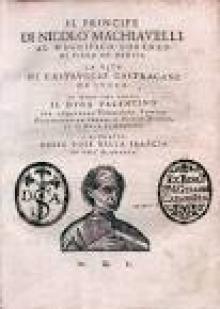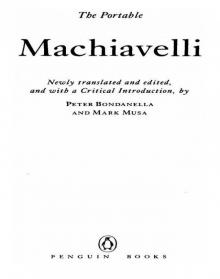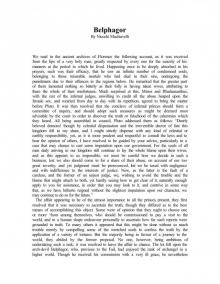- Home
- Niccolo Machiavelli
The Portable Machiavelli
The Portable Machiavelli Read online
Table of Contents
THE VIKING PORTABLE LIBRARY
Title Page
Copyright Page
Dedication
Introduction
THE PRIVATE LETTERS - EDITORS’ NOTE
THE PRINCE - EDITORS’ NOTE
THE DISCOURSES - EDITORS’ NOTE
A FABLE: BELFAGOR, THE DEVIL WHO TOOK A WIFE - EDITORS’ NOTE
THE MANDRAKE ROOT - EDITORS’ NOTE
From THE ART OF WAR - EDITORS’ NOTE
THE LIFE OF CASTRUCCIO CASTRACANI OF LUCCA - EDITORS’ NOTE
From THE HISTORY OF FLORENCE - EDITORS’ NOTE
THE VIKING PORTABLE LIBRARY
THE VIKING PORTABLE LIBRARY
Niccolò Machiavelli
Niccolò Machiavelli was born in Florence in 1469 of an old citizen family. Little is known about his life until 1498, when he was appointed secretary and Second Chancellor to the Florentine Republic. During his time of office his journeys included missions to Louis XII and to the Emperor Maximilian; he was with Cesare Borgia in the Romagna; and after watching the Papal election of 1503 he accompanied Julius II on his first campaign of conquest. In 1507, as chancellor of the newly appointed Nove di Milizia, he organized an infantry force which fought at the capture of Pisa in 1509. Three years later it was defeated by the Holy League at Prato, the Medici returned to Florence, and Machiavelli was excluded from public life. After suffering imprisonment and torture, he retired to his farm near San Casciano, where he lived with his wife and six children and gave his time to study and writing. His works included The Prince; the Discourses on the First Decade of Livy; The Art of War; and the comedy, Mandragola, a satire on seduction. In 1520, Cardinal Giulio de’ Medici secured him a commission to write a history of Florence, which he finished in 1525. After a brief return to public life, he died in 1527.
Peter Bondanella is Director of the Center for Italian Studies at Indiana University. He is the author of Machiavelli and the Art of Renaissance History.
Mark Musa is Professor at the Center for Italian Studies at Indiana University. A former Fulbright and Guggenheim Fellow, he has translated Dante’s Vita Nuova and Inferno.
Each volume in The Viking Portable Library either presents a representative selection from the works of a single outstanding writer or offers a comprehensive anthology on a special subject. Averaging 700 pages in length and designed for compactness and readability, these books fill a need not met by other compilations. All are edited by distinguished authorities, who have written introductory essays and included much other helpful material.
PENGUIN BOOKS
Published by the Penguin Group
Penguin Group (USA) Inc., 375 Hudson Street, New York, New York 10014, U.S.A.
Penguin Group (Canada), 90 Eglinton Avenue East, Suite 700, Toronto, Ontario, Canada
M4P 2Y3 (a division of Pearson Penguin Canada Inc.)
Penguin Books Ltd, 80 Strand, London WC2R ORL, England
Penguin Ireland, 25 St Stephen’s Green, Dublin 2, Ireland
(a division of Penguin Books Ltd)
Penguin Group (Australia), 250 Camberwell Road, Camberwell, Victoria 3124, Australia
(a division of Pearson Australia Group Pty Ltd)
Penguin Books India Pvt Ltd, 11 Community Centre, Panchsheel Park,
New Delhi - , India
Penguin Group (NZ), 67 Apollo Drive, Rosedale, North Shore 0632, New Zealand
(a division of Pearson New Zealand Ltd)
Penguin Books (South Africa) (Pty) Ltd, 24 Sturdee Avenue, Rosebank,
Johannesburg 2196, South Africa
Penguin Books Ltd, Registered Offices: 80 Strand, London WC2R ORL, England
Copyright © Viking Penguin Inc., 1979
All rights reserved
LIBRARY OF CONGRESS CATALOGING IN PUBLICATION DATA
Machiavelli, Niccolò, 1469-1527.
The portable Machiavelli.
A Penguin Book.
Bibliography: p. 41.
1. Machiavelli, Niccolò, 1469-1527. 2. Political science—Early works to 1700.
I. Bondanella, Peter E., 1943- II. Musa, Mark. III. Title.
JC143.M.1’092’4 78-13961
eISBN : 978-1-101-12809-1
The scanning, uploading and distribution of this book via the Internet or via any other
means without the permission of the publisher is illegal and punishable by law.
Please purchase only authorized electronic editions, and do not participate
in or encourage electronic piracy of copyrighted materials.
Your support of the author’s rights is appreciated.
http://us.penguingroup.com
EDITORS’ DEDICATION
For Thomas G. Bergin
INTRODUCTION
An Essay on Machiavelli
MACHIAVELLI’S LIFE AND TIMES
When Niccolò di Bernardo Machiavelli entered the world on May 3, 1469, his prospects were modest at best. The Machiavelli were an established middle-class family from the Oltrarno district of Florence, and its members had held an impressive number of offices in the city’s government, including twelve terms as gonfaloniere, or standard-bearer, and fifty-four terms as prior. Niccolò’s father, Bernardo, however, was not one of the more prosperous members of the clan, and Machiavelli could never hope to rival the wealth or influence of the greater patrician families of Florence, such as the Ridolfi, the Rucellai, the Strozzi, or the Guicciardini. But if Bernardo’s means were insufficient to guarantee his son instant access to economic and political power, his great interest in books, particularly the Latin classics, was perhaps a more valuable legacy. We know that he possessed a copy of Flavio Biondo’s Decades, that he borrowed a copy of Justin’s history, and that he obtained a prized copy of Livy’s history of republican Rome in return for laboriously compiling for the printer an index of Livy’s place-names.
Relatively little is known of Machiavelli’s activities until he entered the Florentine chancery, in 1498, only a few days after the execution of Girolamo Savonarola in the Piazza della Signoria. On June 19, 1498, his election as chancellor of the Second Chancery was confirmed by the Grand Council. Earlier in February of the same year, Machiavelli had been considered for a post in the government but was defeated. This earlier election was the last in which the supporters of Savonarola retained a majority; indeed, Machiavelli’s lack of sympathy for Savonarola, the man he would later remember in The Prince as the prototype of the “unarmed prophet” doomed to failure, is already evident in an early letter he composed in 1498 which describes one of the friar’s sermons. When Machiavelli was finally elected to the chancery, he benefited from a period of anti-Savonarolan feeling; he filled a vacancy caused by the expulsion of a Savonarola supporter.
The secretary’s duties in the Second Chancery often overlapped with those of the more important and prestigious First Chancery. Both dealt with Florentine domestic and foreign affairs, including war and defense; both helped provide the Florentine republic with the governmental continuity and stability that might have otherwise been lacking in the republic’s rapid succession of office-holders on its deliberative bodies. Machiavelli was confirmed on January 27, 1500, and reelected annually until 1512. On July 14, 1498, he received the post of secretary to the Ten of War without, however, any additional staff or salary. Later he was also assigned to serve the newly created Nine of the Militia, a body designed to organize a militia from the Florentine countryside to avoid reliance on mercenary troops. He had supported a citizens’ militia after watching professional troops in the local wars against Pisa, and his faith in citizen soldiers never wavered throughout his life. His views on this topic, as well as on many others, were thus formed
not only by the example of the ancient Romans, whom he always admired and cited, but also by his practical, formative years in the Florentine government.
Machiavelli’s service in the chancery also let him observe firsthand the major European political figures of the period—although his post would never permit him to wield the reins of political power on anything but a very limited scale. Even before his mentor Piero Soderini was named gonfaloniere for life on September 22, 1502, Machiavelli had become his trusted assistant. In 1500 he was sent abroad on his first diplomatic mission to the court of Louis XII, king of France. Arriving there with Caesar’s Commentaries on the Gallic Wars in his saddlebags, Machiavelli met the king (for whom he had little respect) and his powerful minister, Georges d‘Amboise, cardinal of Rouen. Not one to be overly impressed by rank or title, Machiavelli eventually had a sharp exchange of views with d’Amboise over the political talents of the French and his own countrymen, one which he would later repeat in The Prince (III): “When the Cardinal of Rouen told me that Italians understood little about war, I replied to him that the French understood little about politics.” He would return to France on three other occasions: in 1503, 1510, and 1511.
Machiavelli’s three encounters with Cesare Borgia, the warrior son of Pope Alexander VI, were even more important for the formation of his ideas. These meetings took place in Urbino, Imola, and Rome between 1502 and 1503. Many of the dispatches sent to the republic by their envoys during these missions (some of which Machiavelli either wrote personally or helped others to compose) are still extant, and we may compare Machiavelli’s early assessment of this condottiere in his diplomatic letters to later treatments in several minor works and in the memorable seventh chapter of The Prince. When Machiavelli first met him at Urbino, after he had captured the city without a struggle, Borgia delivered an ultimatum to Florence which gave the young Machiavelli a lesson in power politics he would never forget: “This government in Florence does not please me, and you must guarantee the observance of what you have promised me; otherwise, you will understand in a very brief time that I do not wish to live in this manner; and if you do not desire me as a friend, you will find me an enemy.” While the territorial ambitions of Cesare Borgia represented a serious threat to Florentine hegemony in central Italy, Machiavelli could not help admiring the man’s boldness, resolution, and cunning. In one of his dispatches describing the duke’s character, we find one of the first instances in his works where ability or ingenuity (virtù) and good fortune (fortuna ) are joined together in the person of a single historical figure. This is a theme that will occupy much of Machiavelli’s attention in The Prince, where, once again, Borgia’s role will be of crucial importance.
While in Imola at Borgia’s court, Machiavelli wrote his friend Biagio Buonaccorsi for a copy of Plutarch’s Parallel Lives. Here at court Machiavelli had before him the flesh-and-blood prototype of the modem ruler in The Prince while at the same time examining equally heroic figures from Plutarch’s biography. His use of examples from past or present history as a guide for his revolutionary political theory was a completely natural procedure for him, far removed from any purely scholarly, pedantic intent. For Machiavelli, Livy’s Romans were no less real than the warrior standing before him at Imola. But contemporary political leaders such as Louis XII or Borgia could also provide useful information for the discerning observer. Modem political theory did not depend exclusively upon the “golden words,” as he often called them, of classical theorists or historians. In other words, the weight of classical authority is always present in his works but tempered by direct observation. An earlier generation of scholars was fond of describing Machiavelli as the first “scientist” of politics, since he was thought to have based his social theories upon empirical judgments in a manner similar to that employed by Galileo in the natural sciences; in a certain limited sense, these men were not mistaken.
While Machiavelli was to include many of his diplomatic experiences in his later historical and political works, he was not always consistent about the importance of the events he had witnessed. A case in point is his assessment of Cesare Borgia in dispatches written from Rome in 1503 after Pope Alexander VI had suddenly died. At Urbino and Imola, Borgia is pictured as a formidable figure and is recognizable to the reader as the man who will play a major role in The Prince. But in the Roman dispatches his hero is seen as defeated by an equally wily opponent, Pope Julius II. The figure whose earlier resolution and cunning he had praised he now sarcastically sets aside as a loser, and names his mistakes in ironic terms: “Now we see that the duke’s sins have little by little brought him to penitence.” As Borgia has broken the unwritten but immutable rules of politics by placing more trust in the words of Julius than in his own strength, his “penitence” for this completely secular “sin” is the oblivion of political defeat. When, years later, Machiavelli returned to Borgia in The Prince, his judgment would be less harsh, perhaps because his own personal failures had taught him to be more tolerant of men who dared much but achieved less than they dared.
Other diplomatic missions of consequence required Machiavelli to visit Pope Julius II (1506) and the Emperor Maximilian (1507-1508). The first mission eventually produced one of the most memorable passages in The Discourses—the discussion of damaging middle ways of behavior and the fact that men rarely know how to be completely good or completely evil (I, xxvii). The specific occasion for these observations was the removal by Pope Julius of Giovampagolo Baglioni from the tyranny of the city of Perugia in order to return it to the control of the Church. Since Julius entered the town with no escort, Baglioni had an opportunity to murder the Pope but chose not to do so. In The Discourses Machiavelli has modified his earlier description contained in the original dispatches. In the latter, Baglioni was pictured as a perfect gentleman whose human qualities and prudence caused him to reject a drastic means of resolving a political dilemma; now he becomes a rather despicable petty tyrant capable only of crimes and unworthy of great (if infamous) actions. On the other hand, Julius II—an impetuous man who always seemed to succeed in his rash undertakings when wiser men counseled moderation—is here and elsewhere pictured by Machiavelli as a man whose success is due to a propitious coincidence of personal attributes and the tenor of the times, and Machiavelli cites as his classical examples Scipio Africanus, Hannibal, Fabius Maximus, and others to parallel Julius.
Machiavelli’s experiences at Maximilian’s court led to his close friendship with Francesco Vettori. Soderini had wanted to send Machiavelli as the head of the delegation since he trusted him completely, but the patricians opposed to Soderini’s increasing power wanted to send someone of their own class, and Vettori was finally chosen; Soderini was eventually able to send Machiavelli to join Vettori with further instructions. During his stay at the emperor’s court, Machiavelli was able to observe the peoples he had previously known only through the classical histories of Tacitus. When Machiavelli refers to the German people in his works, he means not the northern sections of modem Germany but parts of Switzerland, the Tyrol, and the southern section of the country. His views on these peoples were always colored by the contrasts he found in Tacitus between the then corrupted Romans of the imperial period and the strong, independent Germanic peoples whose simplicity and lack of corrupting luxuries helped to protect their liberty. Rightly or wrongly, Machiavelli seemed to detect these same qualities in the Germans of his day, and his fervent hope was that his native Florence might discover some means to return her defective government to the pure origins of a former time when her population, too, was similar to these northerners.
Machiavelli’s diplomatic experiences thus had a direct influence upon the development of his political theory. They provided him with a ready source of examples to compare against those in his favorite classical authors and supplied him with an experimental laboratory in which he could measure his emerging theories against the yardstick of observable political behavior. His post also gave him practical experience in system
atizing his thoughts and polishing his magnificent prose style, both of which are apparent even in his early diplomatic correspondence.
A number of minor works, including brief essays or sketches, were also produced during the years Machiavelli served the chancery. These, too, reflect the experiences of his diplomatic missions and, like his letters, reappear in his major political and historical writings composed after 1513. A Description of the Method Used by Duke Valentino in Killing Vitellozzo Vitelli, Oliverotto da Fermo, and Others (1503) presents Cesare Borgia and his treacherous deeds at Sinigaglia, later to be treated in The Prince. Remarks on the Raising of Money (1503) employs both classical and contemporary historical examples, underlining the didactic value of historical study. On the Method of Dealing with the Rebellious Peoples of the Valdichiana (1503) opens with a direct contrast between Livy’s description of how the Romans dealt correctly with a rebellion and the mistakes of Machiavelli’s own Florentines in a similar situation; Borgia is again held up as a model to be imitated. In addition to these works treating essentially Italian protagonists or situations, Machiavelli composed a number of brief sketches or portraits of foreign nations and rulers, all of which are based upon his experiences abroad: On the French National Character (1503); Report on Germany (1508); Discourse on Germany and the Emperor (1509); Description of German Affairs (after 1512); and Description of French Affairs (1512-1513).
Because of Machiavelli’s close relationship to Piero Soderini, it was not surprising that he was purged from office on November 7, 1512, when the Medici returned to power and ousted Soderini. On February 12, 1513, Machiavelli was arrested and tortured because his name was found on a list of possible anti-Medici conspirators that had been drawn up by two young Florentines. As far as we can determine, Machiavelli’s name had been placed on the list without his knowledge; this unfortunate fact, combined with his reputation as a strong supporter of Soderini, would have been sufficient to prohibit the Medici from ever employing him in a position of trust. When Giovanni de’ Medici was elected to St. Peter’s throne as Leo X on March 11, 1513, it became clear to all but the most embittered enemies of the Medici faction in Florence that any hope for future employment in the city’s government would rest in their hands. Forced into retirement, Machiavelli returned to his nearby country villa and began writing The Prince, which he was to dedicate to two successive Medici princes. The explanation he gives to his friend Francesco Vettori about the circumstances of the work’s composition is contained in a letter (reprinted in this edition) dated December 10, 1513, wherein Machiavelli’s almost religious veneration for the lessons he learned from the classical historians is revealed.

 The Prince
The Prince Valentino
Valentino The Portable Machiavelli
The Portable Machiavelli History of Florence and of the Affairs of Italy
History of Florence and of the Affairs of Italy Belphagor
Belphagor